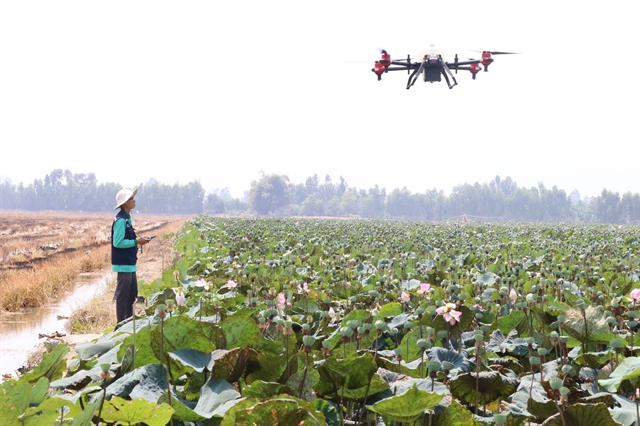 Society
Society

Some farmers in the southern province of Đồng Tháp have started using drones to spray pesticide and fertilizer on their crops after seeing how effective the machines are.

|
| A drone is used to spray pesticide on a lotus farm in Thanh Lợi Commune, Tháp Mười District, Đồng Tháp Province. — VNA/VNS Photo Nguyễn Văn Trí |
ĐỒNG THÁP —Some farmers in the southern province of Đồng Tháp have started using drones to spray pesticide and fertilizer on their crops after seeing how effective the machines are.
Nguyễn Hoàng Tú, a farmer in Thạnh Lợi Commune, Tháp Mười District, said that he had spent VNĐ 1.4 billion (US$60,000) to buy two drones to spray pesticide on his crops and provide the same service for other farmers.
Tú said that over the last two months, he sprayed nearly 1,000ha of rice crops and lotus flowers.
He said he earned about VNĐ140,000-160,000 ($6-7 ) from spraying a hectare of crops, and his drone could deal with seven to ten hectares per day.
“When a disease hits crops, the drones help control it,” he said, adding that the machines also helped tackle increased labour shortages and the negative impacts of chemical pesticide on people who spray manually.
Tú said that spraying pesticide with a drone was 20-30 per cent more efficient than doing it manually.
“I think I will recoup my investment on the drones after two or three years,” Tú said.
Another farmer in Thạnh Lợi Commune, Lê Văn Rạng, said that for decades, he sprayed his 2ha of lotus flowers with a portable pesticide sprayer which he carried on his shoulders.
“It used to take me about 3-4 hours to spray one hectare, and I was worried that I might inhale the pesticide,” Rạng said.
Seeing the drone service advertised in his neighbourhood, Rạng gave it a try and was satisfied with the results.
We used half the amount of pesticide and still distributed it well across the whole field, he said.
When it comes to pesticide/fertiliser spraying drones, Lâm Trọng Nghĩa, a 33-year-old engineer working at Tam Nông District’s Agriculture Services Centre, is considered the first person to introduce the machines to Đồng Tháp Province.
Working at the centre since 2012, Nghĩa was concerned about the way local farmers were spraying pesticide. They did not have modern machines to use, so they did the work manually, which posed a risk to their health while the work was not efficient.
Nghĩa said that he spent time browsing the internet, searching for information about the issue. As soon as learning about AGRAS – a drone provider in Việt Nam - and its products, Nghĩa decided to buy a drone which, he thought, was most suitable for rice farms in his hometown of Đồng Tháp.
In early May last year, Nghĩa took his drone to the rice fields to show local farmers how it worked.
“Many farmers were sceptical about spraying machines at that time,” Nghĩa said, adding that he offered them a free trial on their fields.
“Farmers are quite conservative so it’s important to gain their trust,” Nghĩa said.
Nghĩa said that during his drone’ trials, he used litmus papers to show how evenly the drones spray. The drones help save 90 per cent of water and reduce the pesticide use on the farm by 30 per cent.
More and more local farmers have learnt about Nghĩa’s drone and asked for his services.
Nghĩa said now he had a team and six drones to meet the demand.
The cost of the drones and manual spraying are the same but the drones are more effective.
Nghĩa said that he planned to expand his business and train local people to operate the drones so they have a stable job and income.
Lưu Văn Tiến, vice head of Tam Nông District’s Agriculture and Rural Department, said that the service that Nghĩa provided met the demand of local farmers.
The use of drones helped reduce the amount of chemical pesticide used and chemical residue on post-harvest crops, and avoid crushing crops under foot while spraying manually. As a result, rice productivity had increased by 150-200kg per hectare.
Notably, farmers were no longer directly exposed to chemical pesticide, Tiến said. VNS




